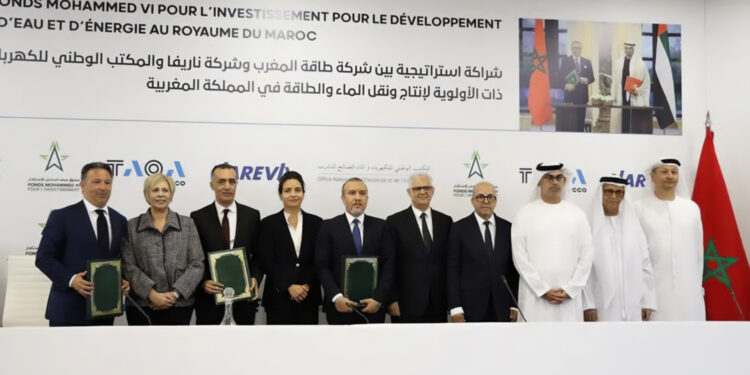Government sectors in Morocco have signed 3 memoranda of understanding with the “Taqah Al -Maghrib” companies – owned by the UAE Energy Company by 85% – and “Nariva” at a value of 130 billion dirhams (13 billion dollars) with the aim of desalination of sea water and enhancing renewable energies.
The agreement was signed by the Moroccan government, the Mohamed VI Investment Fund and the National Office for Electricity and Drinking Water.
Water security and energy
The investment program of these agreements – which fall within the water and energy strategies of Morocco – aims to enhance water security and energy sovereignty in the country.
According to the Moroccan (official) news agency, the program consists of the following axes:
- Water: Inquiry infrastructure to divert water between the two sinks of the Sebu Valley and the Umm al -Rabi Valley with a capacity of up to 800 million cubic meters annually, which will enable facing water stress.
- Sea water desalinationThe establishment of seawater desalination plants with a total capacity of 900 million cubic meters annually, which will be operated entirely by renewable energies, reflecting Morocco’s leadership in this field.
The completion of these stations will contribute to enhancing Morocco’s ability to desalinate water, according to a targeted tariff that is in line with the reference prices specified for the projects being completed, which does not exceed 4.5 dirhams ($ 0.49) per cubic meter. - Transfer electricity: Establishing an electrical line with a continuous current, highly tension with a length of 1400 km, linking southern Morocco to its center, with a capacity of 3000 megawatts, which will contribute to enhancing the ability of national transport and accelerating the development of renewable energies in the southern provinces of the Kingdom.
This line will be operated by the National Office of Electricity and Drinking Water after entering into service. - Renewable energies: Developing additional capabilities to produce electricity from renewable sources of 1200 megawatts, which will enable the increase in green electricity production at the Moroccan level.
- Thermal energy: Developing electrical stations operating in a vehicle using natural gas at the location of a waste, a total capacity of approximately 1500 megawatts, which will enhance the elasticity of the local electrical system.
Partnerships
A statement of the “Taqah Al -Maghrib” company stated that the financing of these projects will be equal between them and Nariva, with the participation of government sectors, such as the Mohammed VI Fund for Investment and the National Office of Electricity and Water by 15%.
The statement stated that the completion of these agreements will take place by 2030.
Morocco urges the steps to secure its energy needs, especially as it imports 96% of them, in conjunction with price fluctuations at the international level.
The Kingdom is working to increase investment in renewable energies, as well as partnerships in the framework of green hydrogen, as part of the efforts to reduce dependency on external sources.
In the past years, Morocco has launched projects, including desalination of sea water, as it faces a real threat due to drought, in light of the decline in rainfall rates in the past years, amid risks staring at the agricultural sector, which represents the country’s gross domestic product.



